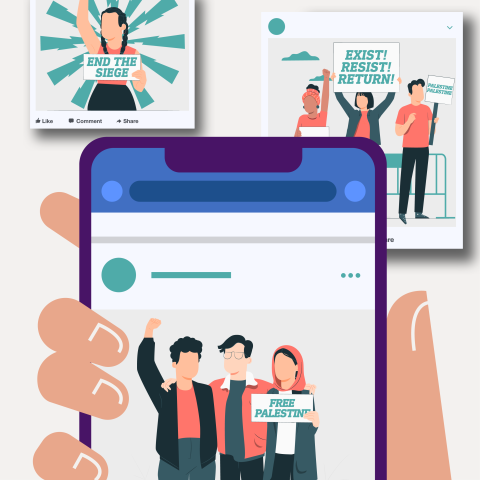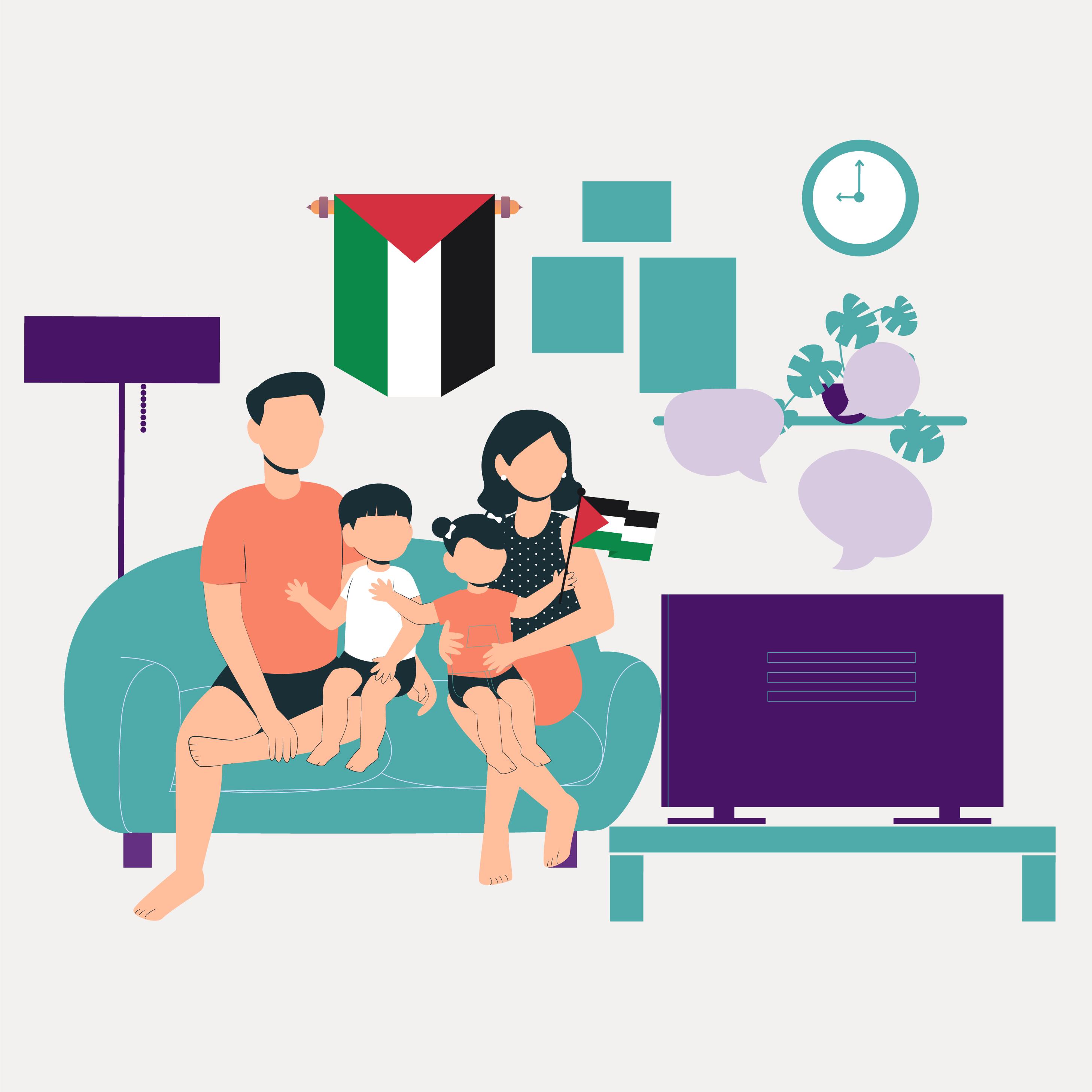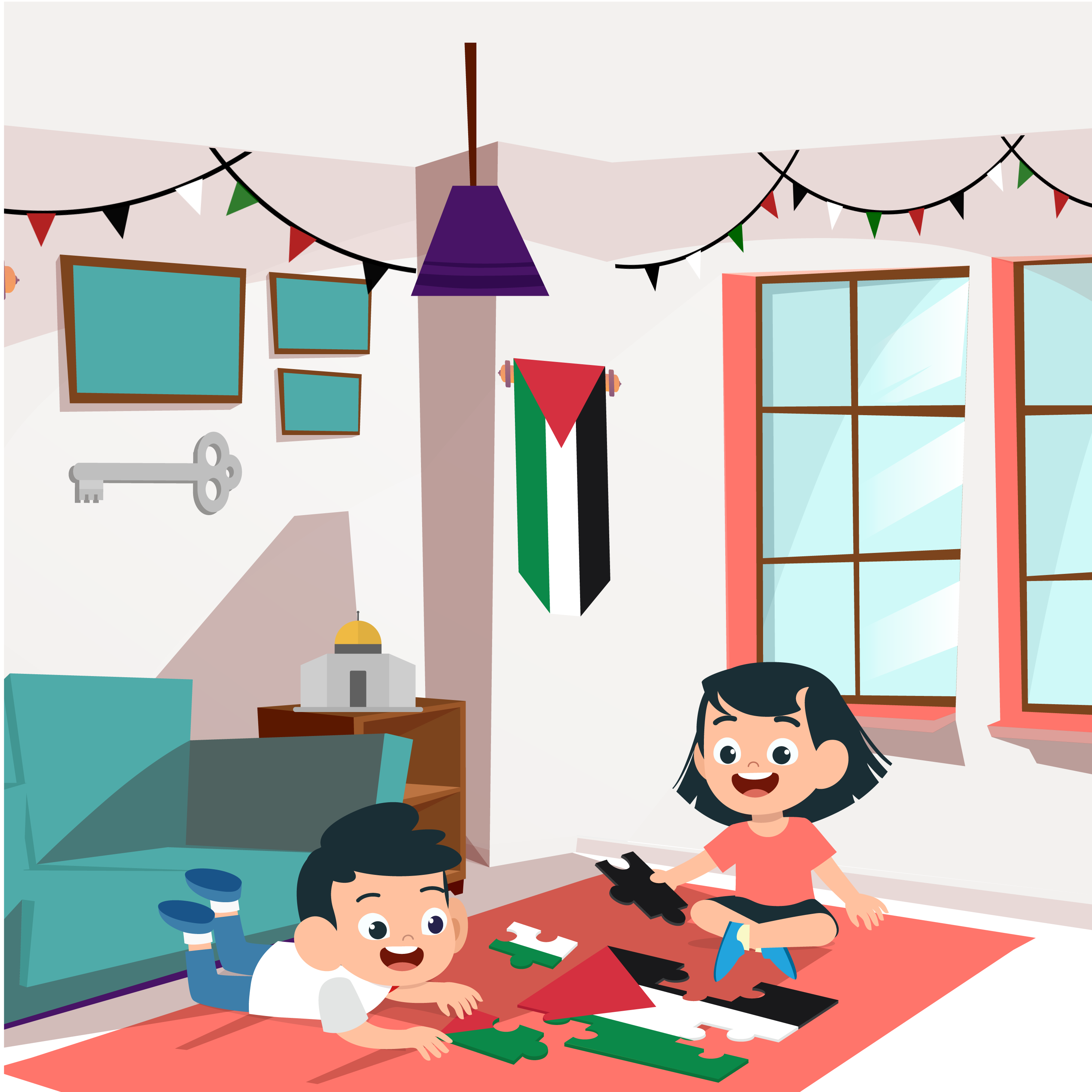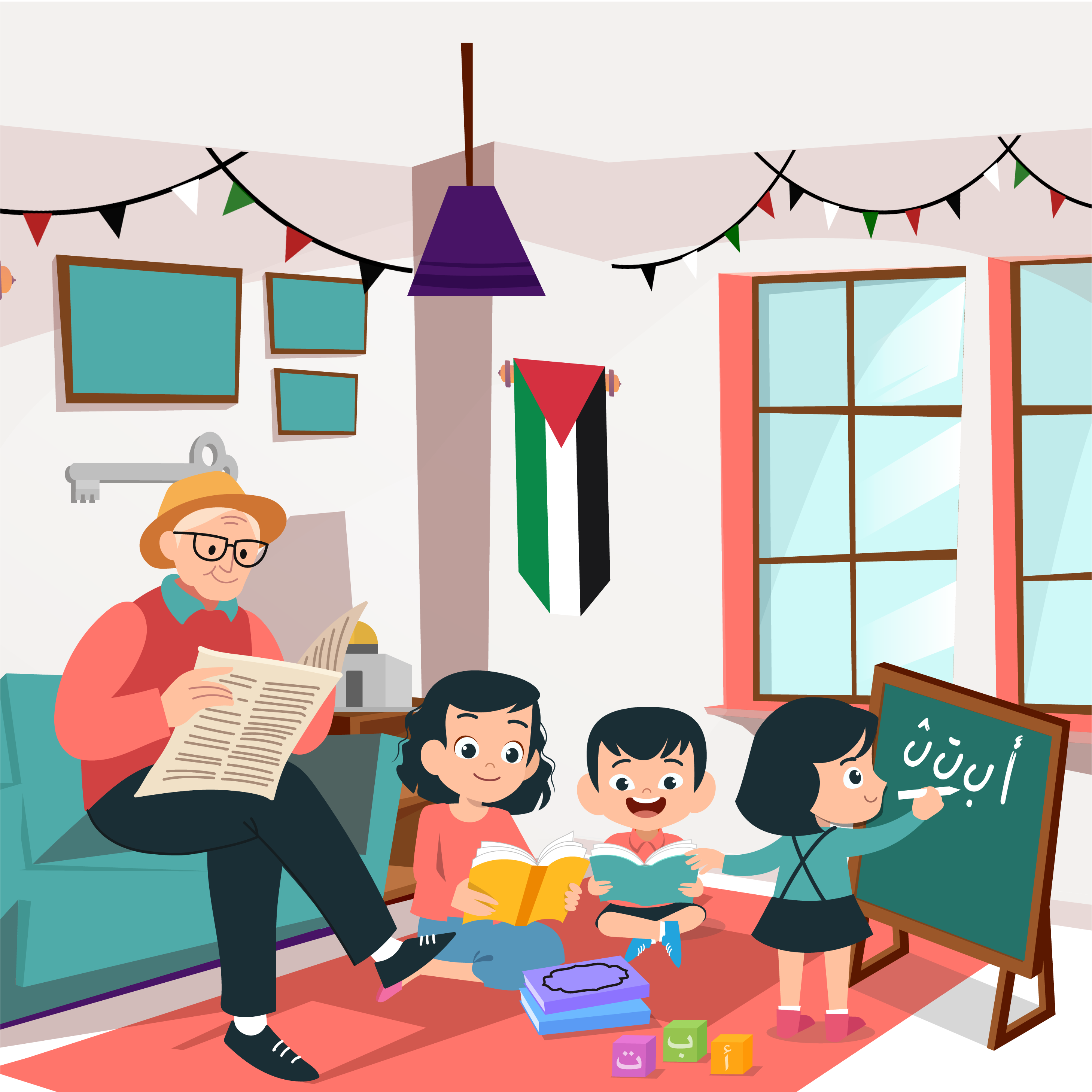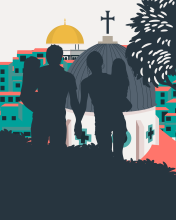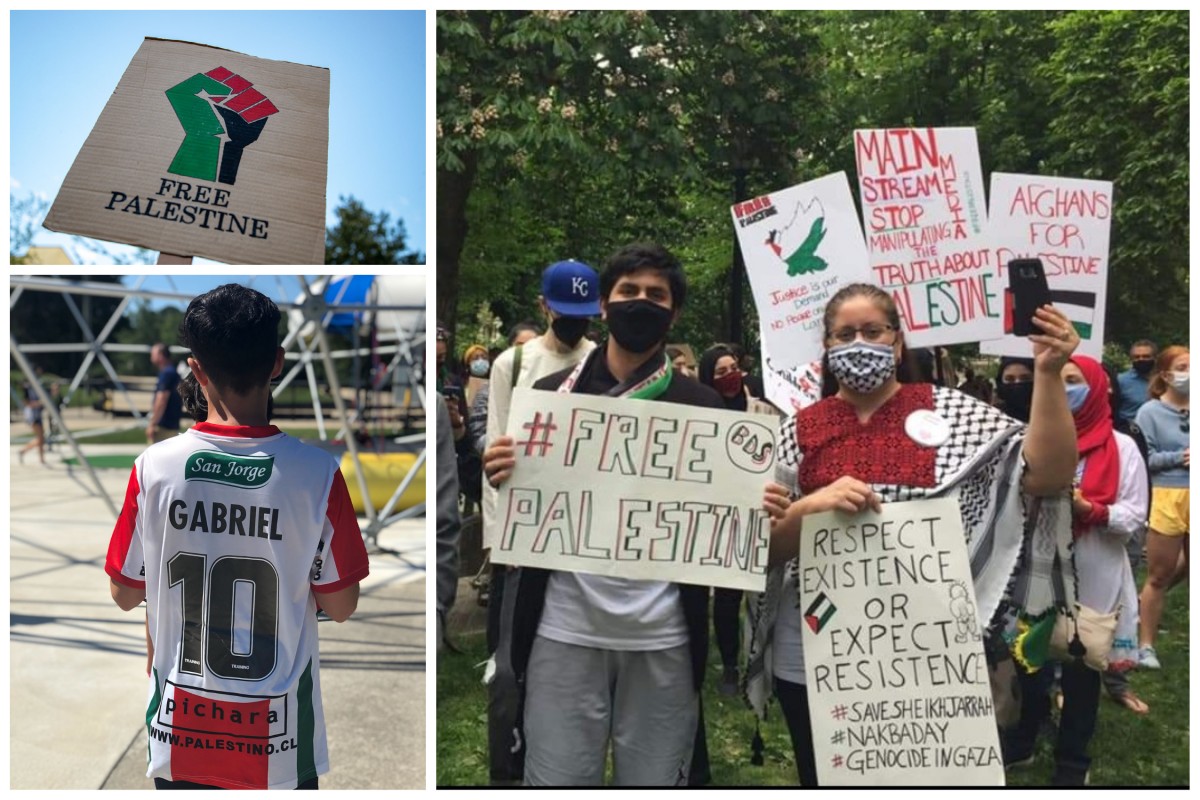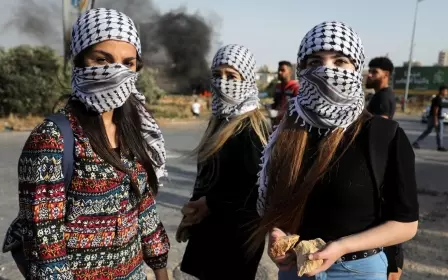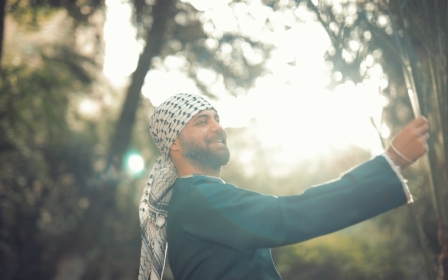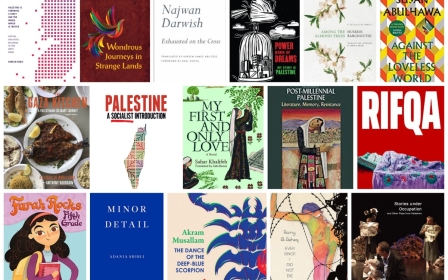How to raise your Palestinian children in the diaspora
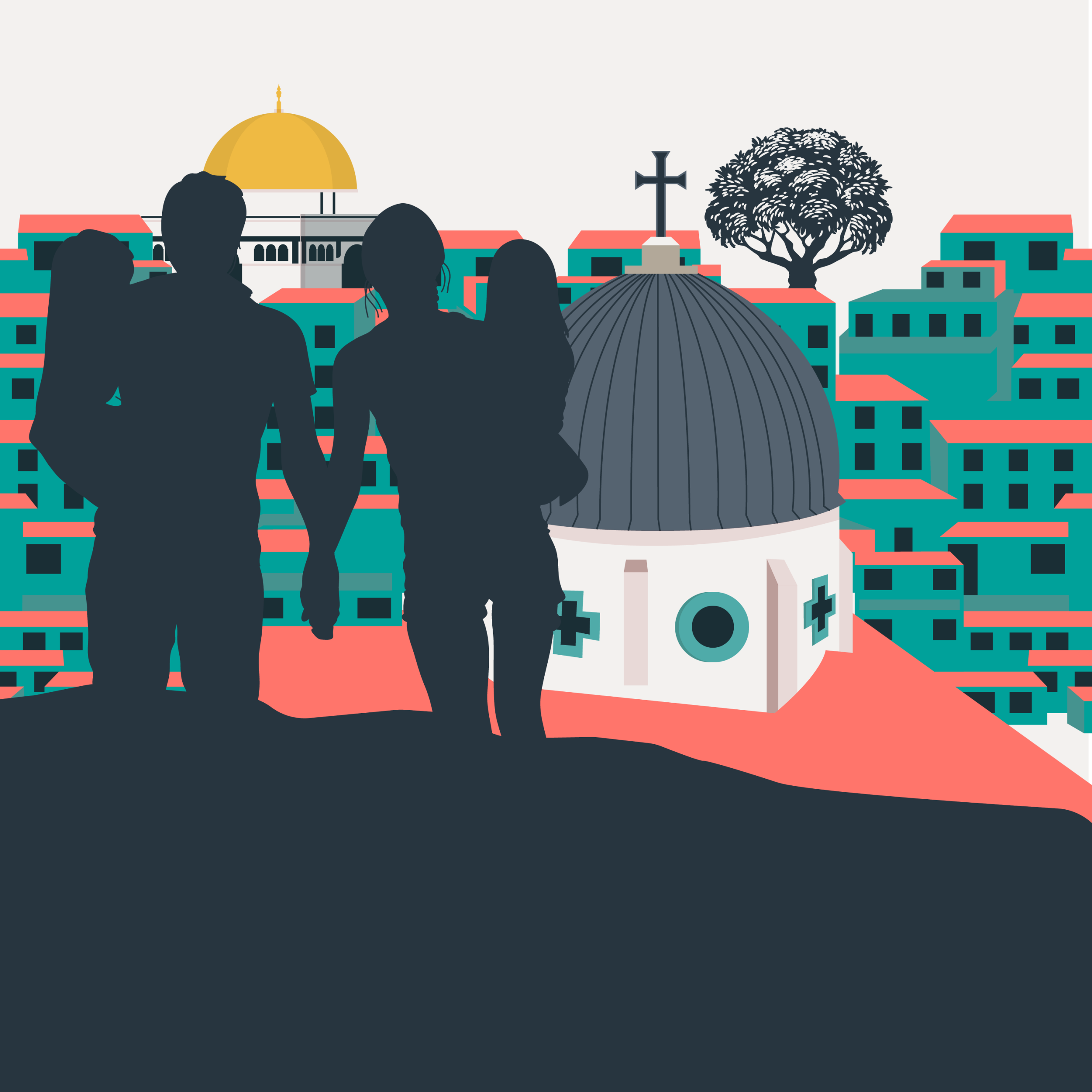
Recently, my childhood friend Salma Zahr called me - she was visiting her parents in Philadelphia and wanted to have a little reunion with the old gang.
Like me, Salma misses the “old days” when our Philadelphia-based Palestinian American community would gather for picnics, pro-Palestinian marches, dabke rehearsals and informal dinners.
The idea for a little reunion had struck Salma while she viewed our friends' Facebook pictures of attending pro-Palestinian rallies in May, after the Israeli army's forced evictions of residents of Sheikh Jarrah. As children and teens, we’d attended rallies like this regularly; now, many were attending them with our own children.
We had all grown up with Palestine. Our parents had been immigrants hoping to create their own sense of home with one another in the diaspora. Though they worked in different fields and hailed from various regions of Palestine, they shared a common mission: to make sure that we grew up feeling connected to our Palestinian roots.
New MEE newsletter: Jerusalem Dispatch
Sign up to get the latest insights and analysis on Israel-Palestine, alongside Turkey Unpacked and other MEE newsletters
Every immigrant community does this dance - balancing assimilation with the new culture with maintaining ties to the home culture. But for Palestinians, it is more urgent, because we know that Israel is actively trying to erase our existence.
"We must do everything to ensure they [the Palestinians] never do return [...] The old will die and the young will forget," said David Ben-Gurion in 1949.
We have not forgotten.
But maintaining your existence, your roots and culture in the face of erasure is indeed a struggle. Passing that on to your children requires an active strategy.
Some parents ask me: 'I’ve never been to Palestine. I’m not married to a Palestinian. I don’t even speak Arabic that well myself. Can I raise Palestinian American kids?'
My daughter and I brainstormed some ideas and reached out to several families to glean their experiences. Before we share the strategies of other Palestinian parents, let me first say this: the reality of our diaspora is quite cruel. We are trying to forge a connection to a land that isn’t even listed on most maps of the world.
For many of us, Palestine exists in memories shared by parents or grandparents, in an “as-salaam alaikum” and a kiss on the cheek, in a grandmother’s baklava tray, in an embroidered pillow on a sofa. How can these fleeting and small things be passed on to another generation that is even further removed from the source? Are we, the children of immigrants, even the best conduits of Palestinian culture? Our struggle is different to that of our parents, who spent their formative years living in Palestine.
As a children’s author, I have spoken to many Palestinian American parents about this very issue. Some have asked, point-blank: “I’ve never been to Palestine. I’m not married to a Palestinian. I don’t even speak Arabic that well myself. Can I raise Palestinian American kids?”
Yes, habibi. You can.
Teach your kids the history
For some second- and third-generation diaspora Palestinians, this step can be challenging, because you may not be educated about Palestine and the history of the occupation yourself. Some of us learned sporadic historical facts from our parents and grandparents. Some of our elders were so traumatised by being exiled from their land that they never spoke of it at all. Since the Palestinian narrative has been silenced for decades, seek information that is informed by scholarship.
Remember that news headlines are often written in a way that makes the Palestinian struggle for liberation seem like a war between two equally-armed foes, or a battle by Israel to maintain democracy in the Middle East.
These tropes can overwhelm you if you are new to the issue, and even if you are familiar with the history. Also remind yourself that even liberal and progressive friends may still have a shocking blind spot when it comes to Palestine - this should neither surprise nor overwhelm you.
Read books by Rashid Khalidi, Noura Erakat, Noam Chomsky, Edward Said, and other scholars. Groups like the Institute for Middle East Understanding regularly produce videos and articles for people new to the issue; their website has a very helpful Palestine 101 section.
Once you feel informed, share what you have learned with your children, even when they are very young. Kids need to have a sense of identity, and they should understand that they are members of the Palestinian community living in a diaspora, scattered all around the world as a result of the Nakba in 1948.
Listen to news about Palestine with your children. Don’t be afraid to talk to them about the history of the occupation. Of course, use your best judgment and do what feels right. Salma Zahr says, when talking about how to explain the occupation to her five-year-old daughter, “I realised how some of the videos or images can scare and make her feel victimised as a Palestinian child.”
Take your knowledge one step further: join local grassroots and national efforts to support Palestine. Donate to Palestinian charities that make differences to the lives of Palestinians; work as a family to hold fundraisers for Palestine. Attend rallies and demonstrations in support of Palestine and take your children with you.
As a child, one of the fondest memories I have is helping my mother, Alice Muaddi, who was an organiser in our local grassroots organisation, Palestine Aid Society; she bought poster boards and markers and helped me make signs to take to demonstrations in Philadelphia: "Free Palestine" and "End the Occupation". Doing this important work with your children empowers them; children need to feel that, while injustice may exist, they can do something about it.
Surround your kids with culture
Nujoud Fahoum Merancy is a manager for exploration mission planning at NASA; she is also a mother of two. “As a biracial Palestinian,” she says, “I am always connected by the food most. My American mum learned recipes from my Umtie [paternal aunt], so we grew up with the flavours and dishes in our own household fusion."
Merancy made an effort to share Palestinian food with her own children: “When I started cooking, I taught myself more Palestinian recipes and techniques. I am already passing on the recipes to my kids.” There have been a number of excellent Palestinian cookbooks published in recent years, in case you do not have a family member who can teach you.
Decorate your home with Palestinian artwork, such as colourful and handmade tatreez pillow cases, tapestries, and other decor. Better yet, make it a family project to learn how to make it yourself. Organisations like Tatreez and Tea, run by Wafa Ghnaim, offer classes (including online) and tatreez starter kits.
Ghnaim is an educator and scholar who is researching the history of tatreez; she’s also a talented tatreez artist who learned the form from her mother, Feryal Abbasi-Ghnaim, who was renowned for her embroidery skills and often spoke about the history of the art form.
In a 2009 speech and presentation to the World Affairs Council of Oregon and Portland State University, Abbasi-Ghnaim said, “Embroidery is unwritten language, transferred between women to women in silence. My mother taught me, I am teaching my girls, and my girls will teach the next generation.”
What are your children reading?
My daughter Mariam inspired me, five years ago, to create a book series with a Palestinian American character. It broke my heart that my daughter, then aged ten and an avid reader, couldn’t find many books that reflected her own experience.
I was determined to change that for her and for us. Mariam has since read every draft of my Farah Rocks books before I’ve turned them in to my publisher. The importance of children seeing their lives reflected back at them in books cannot be over-estimated.
In recent years, more books for kids of all ages are being published by Palestinian authors. Dalal Dweik, a mother of two in California, says, “I just try to be intentional about celebrating our Palestinian roots. My dad was the only member of his family to come to the US, and my mum is American. I married an American and was the only one of my sisters to keep my last name, because I didn’t want to lose that connection to ‘back home'.”
One of Dweik’s strategies to maintain the Palestinian identity with her own children is to buy books about Palestine: “I think our first one was P is for Palestine and it’s hard to describe how much it meant to hear my little girl at the time read the word ‘Palestine’ in a book.”
Project Arab KidLit Now can help you find books in Arabic and in translation, so that your children read books published not only in North America and Europe but in Arab nations like Palestine.
In addition to surrounding them with Palestinian culture, encourage and foster their sense of pride in being Palestinian via the hobbies and interests they already have. Joel Farran, a father and higher education professional in Chicago, says, “Find something your kids love and make it uniquely Palestinian.” His son loves collecting football jerseys, so he personalised a jersey from Club Deportivo Palestino, a Chilean football club founded by Palestinians, with his son’s name.
In a similar vein, personalise some of their everyday items - T-shirts, scarves, keychains, backpacks, and more - with their Palestinian identity. One of my favourite online shops is Watan, which has a great selection of accessories with a uniquely Palestinian flair.
Many Palestinian artists have Etsy shops, where you can find unique ways to personalise items for your children and your home.
Bring Palestine to your kids' schools
Strive to bring Palestinian history and culture not only to the lives of your own children, but to the lives of other children as well. Become active in your local school system and make sure that other children see, hear and read about Palestine. Most schools have some version of “international festival” or “world cultures day”. You know the drill - each country is represented at a table, and guests can float around, sampling food from Bolivia or playing musical instruments from China.
Volunteer to host a Palestine table - and do NOT allow the school or the PTA president or anyone else to label it the “Middle East” or the “Arab nations” table. Mariam has enjoyed preparing for this activity by making hummus, draping the Palestinian flag along the front, and handing out stickers with the Palestinian flag.
In past years we have also done activities like writing children’s names for them in Arabic, which is always a hit. This kind of representation matters, not only to people attending, but to your child, who will feel their identity, like the identities of their classmates, is confirmed.
Connect through language
Learning Arabic is an important part of raising Palestinian children, because at some point they will wish to be connected in that most powerful of ways - to be able to communicate in the language of Palestine. As they get older, they want to be “in” on what their grandparents or aunts and uncles are saying.
If you speak Arabic, speak it to them; they may answer you in English now, but at some point they will crave it. Even if you are not fluent, or know only some phrases and words, use them! Let your children hear them. Don’t feel bad that you don’t speak Arabic well, or at all; remember that this is a common situation for Palestinians in the diaspora.
Ruba Marshood, a daughter of Palestinian immigrants and a mother of two, says, “As a mother, I try to speak as much Arabic as I can, and regret that - as they have grown into the elementary years - I am finding my limitations. I have been thrilled to find a secular Arabic programme for kids on the weekends. This year, they went virtual and now have one-on-one individual lessons. They don't always love having 'school on weekends'. But this time, they asked for it!”
Indeed, your children will crave the ability to speak Arabic at some point. One of Mariam's friends speaks Korean with her parents, and another speaks Chinese; observing them made Mariam think this was a really cool skill to have and spurred her interest in learning Arabic. If your child expresses this need, make sure to follow up on it, hopefully when they are younger.
Luckily, whatever your children’s ages, there are plenty of resources, such as Little Pim videos for toddlers, as well as software programmes such as Duolingo.
While technology is great, in-person instruction can be far more effective: look at local churches and mosques, who might offer classes, as well as community colleges. Hire a tutor. Ask a grandparent or an elderly person in the community to spend an hour a week with your children.
Supplement with books and other resources. For very young children, I would recommend books by Laila Taji, founder of Arabish Way. Taji describes herself as “an American mum of Arab descent, who struggled to find ways to connect her very American children to their family’s culture”. Her books are meant to make learning Arabic a natural and fun part of a busy family’s everyday life.
Koloud Tarapolsi, founder of A Crafty Arab, has fun activities on her website to help promote Arabic language learning, as well as resources like free printables. She also designed a fun Arabic alphabet colouring book and wall posters that can be purchased via her website.
Make sure your kids are learning Levantine Arabic, not just the formal Modern Standard, so they can actually have conversations with people they know, such as family members. Journalist turned publisher Reem Makhoul wanted her daughter to read books that used colloquial Arabic, but could only find books that used Modern Standard, so she wrote some herself. She's now the owner of Ossass-Stories, a publisher of books in colloquial Arabic.
The big step: Visiting Palestine
If possible, try to travel to Palestine. When I travelled to the West Bank as a child, and later as a college student, it was an experience that touched me deeply. I was able to see, with my own eyes, the places that my parents had told me about.
Before that, being Palestinian to me was a dreamlike identity; but walking the roads in our family’s village, visiting the holy sites in Bethlehem and Jerusalem, sitting in cafes with my cousins and friends, and visiting my relatives all helped to make it real.
My cousin, Najat Jaber-Muqbel, is a busy working mother of three, and I’ve always admired her parenting style, because she has been consistent about teaching her kids about Palestine.
For example, she taught them dabke and helped them form a dabke troupe in their local church, and she is an active member of the Palestinian community. She says, “For me, it was a priority to have my kids know where their roots are, to have a connection to their family in Palestine.”
She added, “I remember my one and only visit home as a child, at the age of seven, meeting all my cousins and extended family. Those memories helped solidify what was already rooted in me, from my parents and family in the States: that I am Palestinian first.
"My husband and I budgeted to take our kids to [the Palestinian village of] Taybeh every two or three years. I wanted my kids to have that affection for Palestine, [for it to] grow naturally from within themselves, as it did with me.”
Stand with other movements
Strive to work in support of other social justice issues. Remember that Palestinians enjoy the support of oppressed people, so we have to be good allies as well.
Recently, Black Lives Matter tweeted: “Black Lives Matter stands in solidarity with Palestinians. We are a movement committed to ending settler colonialism in all forms and will continue to advocate for Palestinian liberation.”
Dalal Dweik says, “A lot of social justice work intersects with the Palestinian struggle. For example, we, as a family, went to a protest against family separation and detention with a sign that said ‘From Palestine to Tornillo, families belong together!’, because I truly believe that we get free when we all get free.”
Ruba Marshood, a mother of two children under 10, teaches them the history of Palestine in context with other examples of colonialism: “We also read about the occupation of the United States, westward expansion (because my son loved trains), the plight of Native Americans, the tragedy of slavery.
"They are connected to the stories of oppressed people and their moral compass is strong. They know who they are.”
Salma did hold her reunion picnic - we all gathered on her lawn, with our vaccinated statuses and our children, and ate Arabic food, listened to Arabic music, and let our children play. It was restorative and wonderful, a respite from the horror of the news from Gaza. The children played in a bouncy castle, and Mariam and her teenage cousin painted hearts and rainbows, as well as Palestinian flags, on the faces of the younger kids.
Growing up yourself and raising children in the diaspora is hard work. But you are not at a disadvantage if you do not speak Arabic, or if you did not grow up listening to Arabic music, or even if you don’t know many Arabs in your community. You’re not at a disadvantage if you are raising your children with a partner who is not Palestinian (in fact, your partner gets bonus Palestinian points, and extra hummus, for helping instil a love for Palestine in their child).
Just as our parents carried Palestine in their hearts and memories, we can carry it too. Explain to your children that it is perfectly natural for a person to feel pulled to different cultures. You don’t have to ever be “either/or” - you can be both. Arab-American writer Ameen Rihani once wrote, “'We are not of the East or the West; No boundaries exist in our breast; We are free.”
With additional reporting by Mariam Darraj.
The views expressed in this article belong to the author and do not necessarily reflect the editorial policy of Middle East Eye.
Middle East Eye delivers independent and unrivalled coverage and analysis of the Middle East, North Africa and beyond. To learn more about republishing this content and the associated fees, please fill out this form. More about MEE can be found here.


